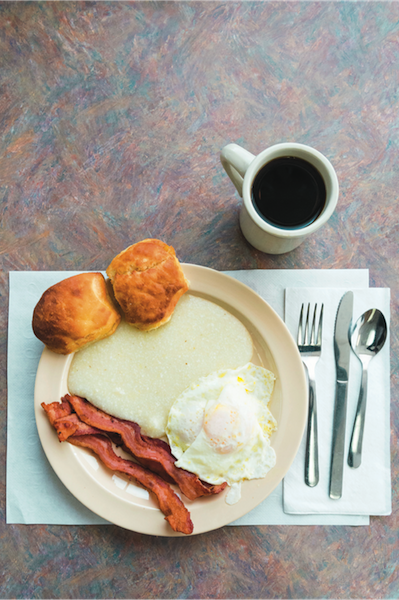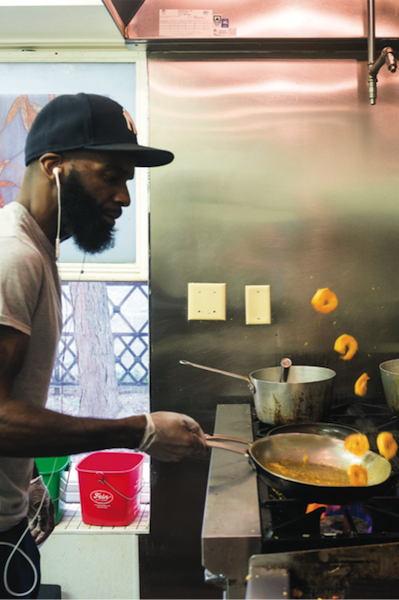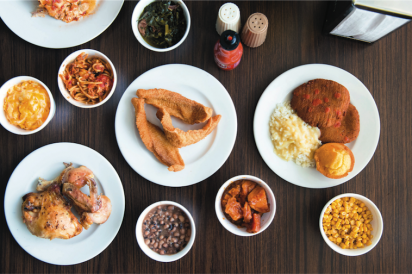Table Talk: Judge Derek Mosley
When you're not judging, I know your passion is food. Tell us about your relationship with food.
Food was a big staple in our family was a kid. It was a time when we all got together and ate. My mom and dad both worked. Growing up, the only time I really got to see them together is when we sat down to eat (and that could be late at night...most people ate at 5:00pm or 6:00pm; we ate at 8:30pm or 9:00pm because that was the time we could sit down and eat together).
Where did you grow up and what was your upbringing like?
I'm from Chicago. My upbringing was pretty good. Both my parents worked hard and both were in the house, happily married. I have a younger sister.
My dad was a Catholic. My mom converted to Catholicism--she became a staunch Catholic. Catholic school my whole life; church every Sunday. I was an altar boy all throughout school. I grew up with a religious root: Sunday church and then meals.
How did you make your way to Milwaukee?
I came to Milwaukee because I got a full scholarship to Marquette for law school.
What has kept you here?
Milwaukee was a place for me where I was able to succeed at what I wanted to do through hard work. I was a prosecutor, and you get recognized for showing compassion and being a good litigator and connected to the community. Those things are really important to me, things I grew up with through my parents (they were very community-active). I fell in love with this community. It is big, but still small enough, everybody knew eachother in the neighborhood, and I was just very fortunate.
I became a judge at age 31, which is something that doesn't happen. At that point, why would I leave to start all over when I'm doing what I want to do and serving the people I love (meaning this community)? I met my wife in law school too. I wasn't going anywhere.
What is your perspective on Milwaukee's food culture?
I think the food scene has expanded greatly since I arrived here. When I first moved here, there weren't many local outfits, homegrown places you could go to get food. There were a lot of chains. Since then, we've had an influx of some amazing chefs who have come into town to expand everybody's palettes for different styles of food. From African to Jamaican to Korean to French, it's become a melting pot of all different groups of people who have come into Milwaukee. It's expanded tremendously. With that being said, Milwaukee is still a city where people like what they know. It's not uncommon to meet people who are like, "It's Friday and because it's Friday, I'm going here for fish fry, because I go here for fish fry every Friday." You meet a lot fo people who haven't expanded past their comfort zone, and it scares me to a point. That's why I got into the food scene; I wanted to use what influence I had to showcase the variety of places we have here in Milwaukee. To hopefully get people who aren't accustomed to eating on the North Side to come to the North Side. Or people who arent accustomed to eating on the South Side to eat on the South Side. It's jsut expanding into neighborhoods and it's not just downtown, its all over the city. That's the thing now that is slowly starting to happen... people are starting to get out of their comfort zones and go to different places.
Here's the best part of it for me: there is one thing we all have in common, and that is, we have to eat. If we are going to live, we all have to eat. Why not make that the center or focus of our communication with eachother? With out socialization with eachother, with our fellowship with eachother...why not make the food the center, because we all need it to survive?
So how would you define comfort food?
Comfort food for me is food Mom made, food Grandma made. It was food where, after you eat it, there is nothing better than laying down on the couch and taking a nap. Food that not only warms your body, but warms your soul. That's comfort food to me.
Waht really stood out as you were touring around North Side restaurants [for this interview]?
There are very few places in Milwaukee (or anywhere), where you can meet old and young people socializing together. Very rare. What I loved about the places where we went is that they were places we would sit down, and there was an 80-year-old man yucking it up with a 26-year-old kid yucking it up with 50-year-old women. There are places where people can actually come together and talk, despite their age difference. You don't see old and young going to the movies together or the bowling alley together, but you do seem them at the places we went together. There were three different generations sitting right next to us at a table. It was heartwarming to see.
Tell me about Mr. Perkins Family Restaurant.
When I first moved to Milwaukee, Mr. Perkins was explained to me as "the black country club." Black people weren't going to country clubs. Country clubs were where people were making deals; where people were talking about what was going on in the world, about money; all the things that were going on at the country club for white people. Black people really didn't have that, and so Mr. Perkins became that place, where the black community could go and talk about all those same things over comfort food.
So I go there for breakfast in the morning, and it's the same people in there, and we are talking about everything from politics to sports to to our children, you name it. When Paul [the photographer on this story] was sitting there, a guy turned to is and started talking about how bad the driving was in the city. It's a place where people feel comfortable talking. You have me sitting there; I'm a judge, and it's not often you can sit down with a judge and talk to him about black people driving crazy. You could be sitting next to an alderman, the mayor, the guy who picks up your trash... everyone is equal once you walk in that door.
You must see a lot of issues from the bench. Milwaukee has some issues. Do you see food as a potential unifier of these issues? Can food bring people together?
You better believe it! It's the thing we all have in common, whether you are black, white, brown, republican, democrat, independent... no matter who you are, you need food to survive. Without it, you will die. If that's the thing we all have in common, why don't we center that conversation over dinner or at lunch? Because it's a disarming thing... you sit down and relax in front of a plate of food and you can be yourself. It's a perfect common demoninator for everyone.








